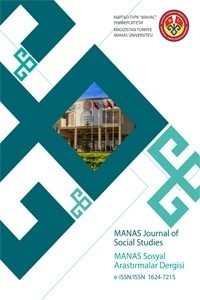The Issue of God’s Knowledge of Particulars: Comparison of Visions of Avicenna, Gazzâlî and Hojazadhe
Öz
One of the most fundamental features of the Islamic thought that it has a dynamic apologethicphilosophical debate that is ongoing simultaneously or on a continuous basis. These discussions, which are called "Tradition of Criticism", are undoubtedly the debate which started with the work of Tehâfütü'l-Felâsife (Inconsistency of Philosophers), which is the first and the most famous, in which Ghazzali has written to criticize philosophers, especially Avicenna. AlGazzâlî claimed that philosophers committed big sin in three matters: Receiving the eternity of world with God, God will not know partials and realization of the resurrection in the life after death without body. In this study, we will examine and compare the views of the issue of God’s knowledge of particulars with the views of Avicenna, Gazzâlî and Hojazadhe.
Anahtar Kelimeler
Kaynakça
- Acar, R. (2005). Yaratan Bilmezse Kim Bilir? İbn Sînâ’ya Göre Allah’ın Cüz’îleri Bilmesi. İslami Araştırmalar Dergisi, 1-23.
- Akyol, A. (2006). Zorunlu Varlığın Tikelleri Bilmesi Üzerine. Hitit Üniversitesi İlahiyat Fakültesi Dergisi, 111-130.
- Demirkol, M. (2010). Tûsî’nin İbn Sinâ Savunması. Ankara: Fecr Yayınları.Deniz, G. (2015). Kelam- Felsefe Tartışmaları. Ankara: Fecr Yayınları.
- el-Gazzâlî, E. H. (trhsz). Kitab el-Maksad el-Esnâ şarh esmâ’ Allah el-Husnâ. Kahire.
- el-Gazzâlî, E. H. (2011). Tehâfütü-l Felâsife, Dirase ve Ta’lik: Adil Abdulmunim Ebu Abbas. Kahire: Dar'üt-Telaih.
- el-Râzi, F. (tarih yok). Meâlimu Usul’id-Din, Thk. Taha Abdulrâuf Seâd. Beyrut: Dar’ul kitab el-Arabi.
- Fahri, M. (2000). İslam Felsefesi Tarihi. İstanbul: Birleşik Yayıncılık.
- Koç, T. (1992). Gazali’ye Göre Allah’ın Bilgisi. Erciyes Üniversitesi İlahiyat Fakültesi Dergisi,123-139.
- Mustafa, H. M. (2018). Et-Tehâfüt Fi’l-Muhâkeme Beyne’l Gazzâlî ve’l Felâsife. Thk., Luay Hatem Yaqoob. Beyrut: Dâr’ül-Risale el-Alemiyye.
- Rüşd, İ. (2011). Tehâfütü-t Tehâfüt. Kahire: Mektebet İbn Sinâ.Rüşd, İ. (tarih yok). Faslu’l Makal fi ma beyne el-Hikme ve’ş-Şeria min’el İttisal. Kahire: Dirase ve Ta’lik: Mohammed Ammarah, Dar’ul Maarife.
- Sînâ, İ. (2005). el-İşârât ve't Tenbihât, çev. Ali Durusoy-Muhittin Macit-Ekrem Demirli. İstanbul: Litera Yayıncılık.
- Sinâ, İ. (2013). Kitâbu’ş-Şifâ, çev. Muhittin Macit-Ekrem Demirli-Ömer Türker. İstanbul: Litera Yayıncılık.
- Taylan, N. (2010). Anahatlarıyla İslam Felsefesi. İstanbul: Ensar.
- Vural, M. (2004). Gazzâlî Felsefesinde Bilgi ve Yöntem. Ankara: Ankara Okulu Yayınları.
Allah’ın Cüz’îleri (Tikeller) Bilmesi Meselesi: İbn Sinâ, Gazzâlî ve Hocazâde’nin Görüşlerinin Karşılaştırılması
Öz
İslam düşüncesinin en temel özelliklerinden biri,
eşzamanlı ya da artzamanlı olarak süregelen, dinamik kelâm-felsefe
tartışmalarına sahip olmasıdır. “Tehâfüt geleneği” biçiminde adlandırılan bu
tartışmaların hiç şüphesiz ilki ve en meşhuru, Gazzâlî’nin, başta İbn Sinâ
olmak üzere filozofları eleştirmek için kaleme aldığı “Tehâfütü’l-Felâsife (Filozofların
Tutarsızlığı)” adlı eseriyle başlayan tartışmadır. Gazzâlî, şu üç meselede
filozofların küfre girdiğini iddia etmiştir: Allah ile beraber âlemin kadîm
sayılması, Allah’ın cüz’îleri bilemeyeceği ve ölümden sonraki hayatta bedensiz
dirilişin gerçekleşmesi. Biz bu çalışmada Allah’ın cüz’îleri bilmesi meselesini
İbn Sina, Gazzâlî ve Hocazâde’nin görüşlerini karşılaştırmak suretiyle ele alıp
inceleyeceğiz.
Anahtar Kelimeler
Kaynakça
- Acar, R. (2005). Yaratan Bilmezse Kim Bilir? İbn Sînâ’ya Göre Allah’ın Cüz’îleri Bilmesi. İslami Araştırmalar Dergisi, 1-23.
- Akyol, A. (2006). Zorunlu Varlığın Tikelleri Bilmesi Üzerine. Hitit Üniversitesi İlahiyat Fakültesi Dergisi, 111-130.
- Demirkol, M. (2010). Tûsî’nin İbn Sinâ Savunması. Ankara: Fecr Yayınları.Deniz, G. (2015). Kelam- Felsefe Tartışmaları. Ankara: Fecr Yayınları.
- el-Gazzâlî, E. H. (trhsz). Kitab el-Maksad el-Esnâ şarh esmâ’ Allah el-Husnâ. Kahire.
- el-Gazzâlî, E. H. (2011). Tehâfütü-l Felâsife, Dirase ve Ta’lik: Adil Abdulmunim Ebu Abbas. Kahire: Dar'üt-Telaih.
- el-Râzi, F. (tarih yok). Meâlimu Usul’id-Din, Thk. Taha Abdulrâuf Seâd. Beyrut: Dar’ul kitab el-Arabi.
- Fahri, M. (2000). İslam Felsefesi Tarihi. İstanbul: Birleşik Yayıncılık.
- Koç, T. (1992). Gazali’ye Göre Allah’ın Bilgisi. Erciyes Üniversitesi İlahiyat Fakültesi Dergisi,123-139.
- Mustafa, H. M. (2018). Et-Tehâfüt Fi’l-Muhâkeme Beyne’l Gazzâlî ve’l Felâsife. Thk., Luay Hatem Yaqoob. Beyrut: Dâr’ül-Risale el-Alemiyye.
- Rüşd, İ. (2011). Tehâfütü-t Tehâfüt. Kahire: Mektebet İbn Sinâ.Rüşd, İ. (tarih yok). Faslu’l Makal fi ma beyne el-Hikme ve’ş-Şeria min’el İttisal. Kahire: Dirase ve Ta’lik: Mohammed Ammarah, Dar’ul Maarife.
- Sînâ, İ. (2005). el-İşârât ve't Tenbihât, çev. Ali Durusoy-Muhittin Macit-Ekrem Demirli. İstanbul: Litera Yayıncılık.
- Sinâ, İ. (2013). Kitâbu’ş-Şifâ, çev. Muhittin Macit-Ekrem Demirli-Ömer Türker. İstanbul: Litera Yayıncılık.
- Taylan, N. (2010). Anahatlarıyla İslam Felsefesi. İstanbul: Ensar.
- Vural, M. (2004). Gazzâlî Felsefesinde Bilgi ve Yöntem. Ankara: Ankara Okulu Yayınları.
Ayrıntılar
| Birincil Dil | Türkçe |
|---|---|
| Bölüm | Araştırma Makalesi |
| Yazarlar | |
| Yayımlanma Tarihi | 22 Şubat 2019 |
| Gönderilme Tarihi | 12 Eylül 2018 |
| Yayımlandığı Sayı | Yıl 2019 Ek Sayı 1 |
Kaynak Göster
Cited By
İbn Sînâ'ya Göre Allah Cüzîleri Bilir; Fakat Nasıl?
Marife Dini Araştırmalar Dergisi
https://doi.org/10.33420/marife.909923
MANAS Journal of Social Studies (MANAS Sosyal Araştırmalar Dergisi)


